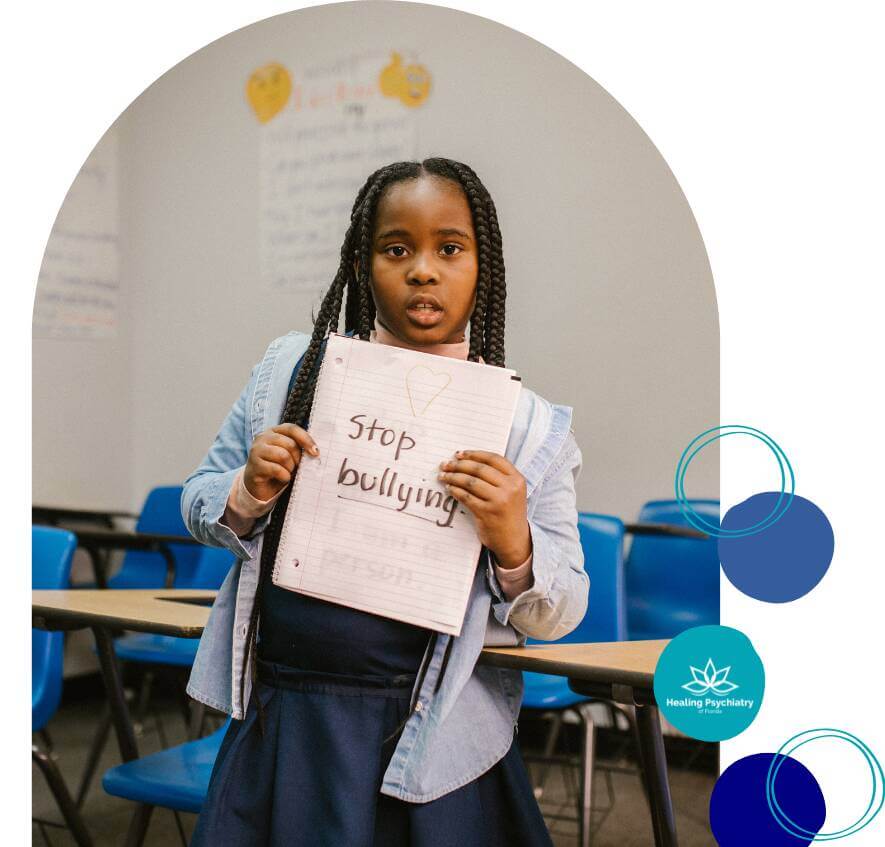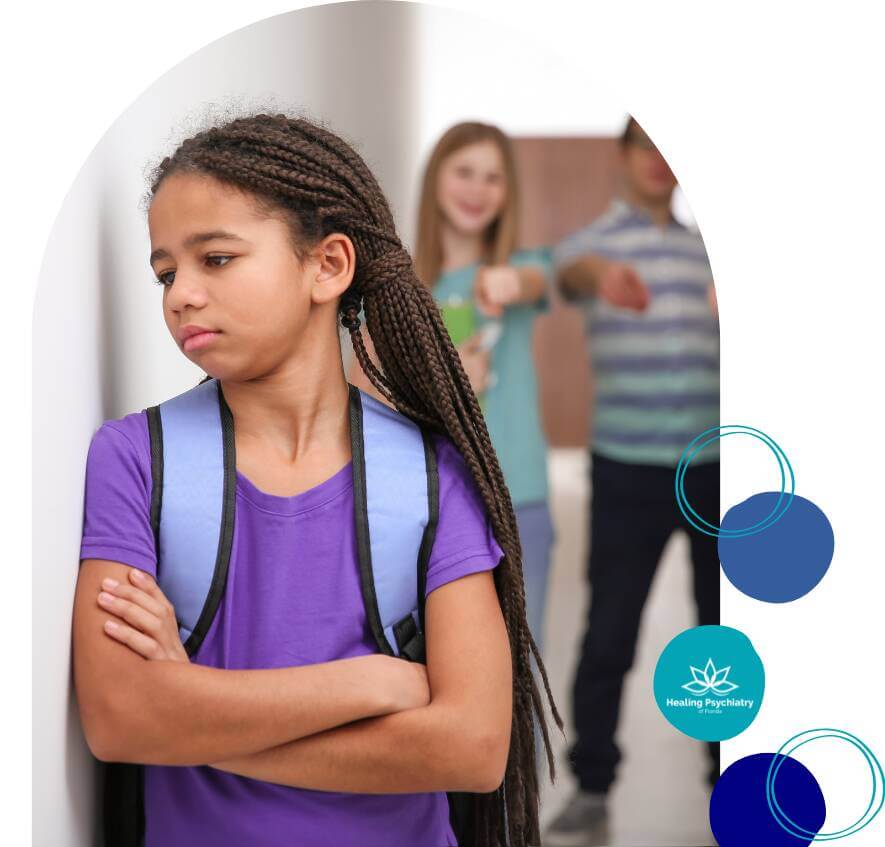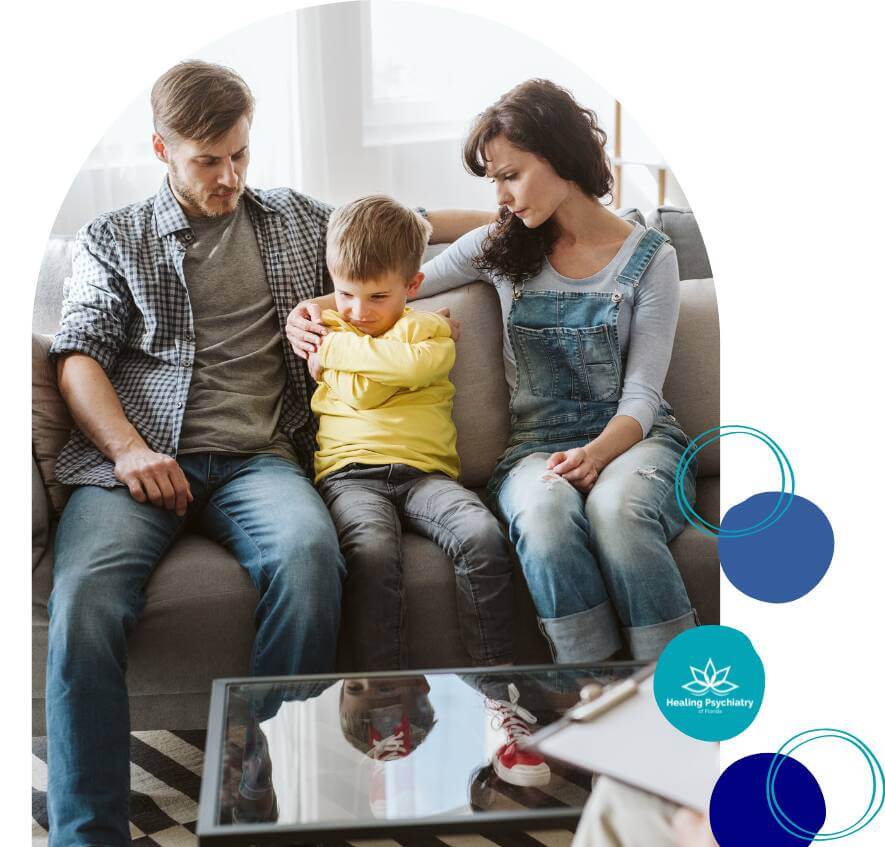Children’s Therapy for Bullying
Helping Kids Ages 5–12 Cope with Bullying and Build Confidence
Bullying in childhood can take many forms—teasing, exclusion, physical threats, or online harassment—and it can deeply impact a child’s developing sense of self. Kids between the ages of 5 and 12 are still learning to identify emotions, trust adults, and build confidence. When bullying occurs, these foundations can be shaken.
Our therapy sessions help children process what’s happening, regain confidence, and develop practical, age-appropriate coping skills. Whether the bullying occurs at school, online, on the playground, or within extended family, we offer a supportive space designed just for them. We also support children who have witnessed bullying and don’t know how to intervene or speak up safely.

Start Your Session Today
Bullying Behavior in Today’s World: What We See and Address
Bullying today reaches far beyond name-calling in the playground. For children aged 5–12, it can include exclusion in group activities, repeated teasing on class chats, mocking a child’s speech or cultural background, or being targeted for their learning style or appearance. We begin each therapeutic relationship by identifying exactly what your child has experienced, including peer bullying at school, digital messaging during the school day, or emotional distress triggered by other students.
Coping Skills for Social Media and Online Bullying
Even in early school years, many children are exposed to messaging apps, multiplayer games, and class chat groups where bullying can happen quietly and quickly. Our therapy uses cognitive behavioral therapy techniques to help children recognize how online words can impact self esteem—and what to do when it happens. We teach positive self talk, deep breathing, and assertive communication through guided roleplay and visual tools that are appropriate for a child’s age. The goal is not just emotional comfort, but giving children real-time strategies they can practice when online bullying occurs again.
How We Help Children Cope After Peer Rejection or Humiliation
For many children, the worst part of bullying isn’t a threat—it’s being left out, laughed at, or made to feel invisible. These moments often happen during the school day, in front of other students, with little adult intervention. In our sessions, we explore these bullying experiences through story-based conversation, expressive play, or social skills training. The child learns what a healthy peer interaction looks like and how to respond when it breaks down. Over time, we help children build confidence not by avoiding social challenges—but by practicing how to face them with new tools and self efficacy.
Supporting Young People from Marginalized Backgrounds
Children from culturally diverse families, neurodivergent backgrounds, or those who look or speak differently from their peers are at higher risk of bullying victimization. In therapy, we provide support that acknowledges those experiences without making them the child’s burden. Our mental health professionals use a strengths-based approach, building social support, encouraging children to practice social skills in roleplay, and preparing them to speak clearly and confidently in social spaces. Group therapy may be recommended where appropriate to reinforce inclusion, build friendships, and foster a sense of community-level safety.
Insurances Accepted










See what others are saying about Healing Psychiatry of Florida
Meet Our Specialists: Experts in Child-Focused Bullying Therapy
Our team includes licensed mental health professionals with specific training in child development, bullying prevention, and behavioral therapy for ages 5 to 12. Each therapist is experienced in working with bullying victims across classroom, digital, and community settings. Whether a child is facing low self-esteem, withdrawal, or unexplained physical complaints like stomach aches, our therapists are trained to identify the patterns and respond with developmentally appropriate care.




Bullying Therapy That Responds to the Child’s Age and Experience
When a younger child (5–8) comes into therapy after being excluded at school, the emotional reaction often shows up as withdrawal, stomach aches, or outbursts at home. These children don’t yet have the language to explain peer rejection. With therapy over time, the child learns how to recognize those feelings, speak about them, and roleplay what to do when the exclusion happens again. Older children (9–12) tend to present with more internalized bullying experiences—like rumors, humiliation in front of other students, or messages sent in secret. These sessions don’t just address the emotional injury—they teach a skill the child can apply next time the bullying occurs.
Building Confidence Through CBT and Social Skills Training
Confidence is built through action. In bullying therapy, we use cognitive behavioral therapy (CBT) alongside social skills training to help children rebuild belief in their voice, value, and ability to connect. A child who was mocked during a class presentation, for example, may be guided to recreate that moment in therapy through roleplay. The therapist pauses the moment where the anxiety began and introduces a coping skill—like deep breathing, assertive phrasing, or mentally re-framing the audience. This process is repeated and rehearsed until the child can respond with confidence, not panic.
Over time, the child doesn’t just learn how to avoid negative consequences—they learn how to enter social situations with clarity and self efficacy.


Family and School Involvement: Addressing Bullying at Every Level
Therapy connects with every system that surrounds the child. When a child tells their parent or teacher about bullying, the response matters. That’s why our service includes coordination with school officials and family members to create a consistent plan. Whether bullying is happening during recess, in group projects, or through social networking apps tied to the classroom, we build clear communication strategies between the child, home, and school level support systems.
We also offer structured family sessions where parents and children practice positive communication and build routines that reduce the long-term mental health problems linked to bullying—like anxiety disorders, disordered eating, and self harm.
FAQs: Children’s Therapy for Bullying
What kinds of bullying do you address in therapy?
We work with children who have experienced peer bullying, social exclusion, name-calling, online harassment, and other forms like physical intimidation or rumor-spreading. Our approach also helps with less obvious dynamics, such as when bullying is embedded in group play or classroom roles. Therapy is customized to what your child has gone through and how they responded.
Do you offer support for children in middle school?
Yes, as long as the child falls within our 5–12 age range. Some children in middle school settings begin experiencing complex bullying problems, especially related to appearance, speech, or friendships. We address these using social skills training, cognitive behavioral therapy, and scenario-based rehearsal that’s appropriate for this age group.
Are therapists trained in adolescent psychiatry or mental health?
How involved are parents or guardians in the therapy process?
We meet with family members regularly to discuss progress, reinforce coping strategies at home, and build a unified response plan. Most bullying begins in school settings but plays out across family life. We support parents with tools to build confidence in their children and establish a supportive environment that lasts beyond therapy.
Do you work with school staff directly?
When consent is given, yes. We support communication with school officials to advocate for safe peer dynamics, increased adult supervision, and school-based interventions. This can include teacher meetings, written recommendations, or consultation on behavioral plans.
What if the bullying has caused emotional shutdown or physical symptoms?
We regularly see children who present with symptoms like sleep trouble, appetite changes, or stomach aches. These may signal anxiety disorders or deeper emotional stress from bullying victimization. Therapy helps children process these responses and build coping strategies that reduce their intensity over time.
Are group therapy or support groups part of your service?
We offer group therapy where appropriate and may recommend external support groups as a follow-up. These settings give children the chance to practice communication, build relationships, and see that their experiences are not isolated. Group work is introduced thoughtfully, only when it supports the child’s therapeutic goals.
Can this therapy prevent future bullying or is it just about recovery?
It does both. Children learn to recognize harmful dynamics early, use assertive communication, and seek adult help with confidence. These tools reduce the risk of repeated targeting and support long-term emotional resilience. We aim to help young people not just recover from bullying, but also become better equipped to respond if it happens again.
Why is early intervention important?
Most bullying goes unnoticed until it begins to impact school performance or emotional stability. When we intervene early, we can reduce the chance of long-term mental health problems, disordered eating, or self-harm. Therapy during the primary school years is one of the most effective ways to prevent escalation.
Is this only for children who have been bullied?
No. We also work with children who may be showing early bullying behavior, struggling with impulse control, or misunderstanding social boundaries. Therapy provides a safe space to build empathy, self-regulation, and positive communication patterns before the problem becomes more serious.
Contact us
For more information about our systems and services, contact Healing Psychiatry of Florida.
Healing Psychiatry of Florida
108 W Citrus St, Altamonte Springs, FL 32714
help@healingpsychiatryflorida.com
Opening Hours
Monday – Thursday: 8AM – 7PM
Friday: 8AM – 5PM
Saturday: Closed
Sunday: Closed
OCD Therapy Altamonte Springs, FL
